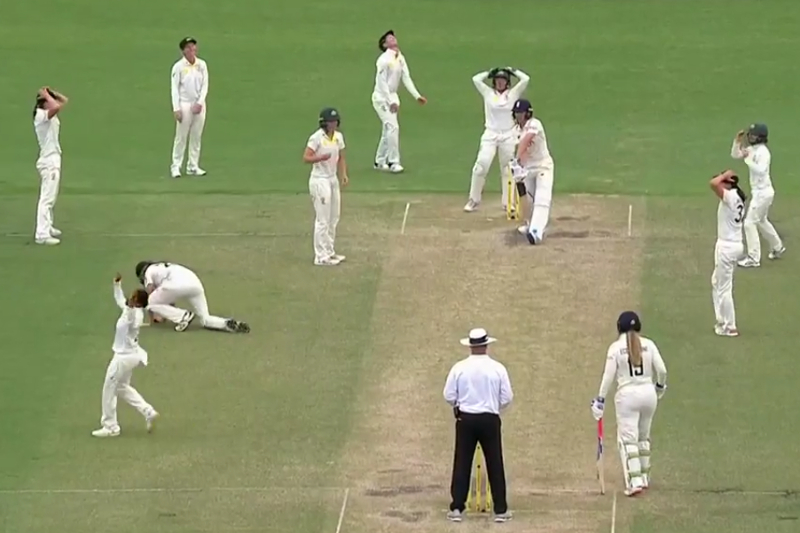Good news, everyone! Some Women’s Tests are probably happening!
Women’s Test matches are so rare, the possibility another one might actually happen tends to be headline news.
The BBC have gone with “England to play first West Indies Test since 1979” which does a pretty good job of summing things up. It’ll be in 2027 and it’ll also be the first Test England have played over there.
The BBC article also reveals that England have further Test matches lined up against India, Australia and South Africa before the end of 2029. Busy times!
The women’s Test schedule is in fact so easy-paced that we’re happy to type it out in full. In fact we’ll do it nation by nation, even though that means highlighting each match twice.
Australia (eight Tests)
- January 2025: Home v England
- February 2026: Home v India
- March 2026: Away v West Indies
- March 2027: Away v South Africa
- July 2027: Away v England
- December 2027: Away v India
- February 2028: Home v South Africa
- February 2029: Home v England
England (eight Tests)
- December 2024: Away v South Africa
- January 2025: Away v Australia
- July 2026: Home v India
- April 2027: Away v West Indies
- July 2027: Home v Australia
- June 2028: Home v South Africa
- December 2028: Away v India
- Feburary 2029: Away v Australia
India (five Tests)
- February 2026: Away v Australia
- July 2026: Away v England
- December 2026: Away v South Africa
- December 2027: Home v Australia
- December 2028: Home v England
South Africa (six Tests)
- December 2024: Home v England
- December 2026: Home v India
- March 2027: Home v Australia
- February 2028: Away v Australia
- June 2028: Away v England
- December 2028: Home v West Indies
West Indies (three Tests)
- March 2026: Home v Australia
- April 2027: Home v England
- December 2028: Away v South Africa
These tests are probably happening?
We don’t know who wrote the ICC press release, but it is not characterised by precision of language. “Members have also pencilled in more Test matches this time,” it says at one point – which makes all of these matches sound highly provisional.
We imagine they are, but then elsewhere it says of the various planned multi-format series that, “Australia will play the maximum such series.”
The maximum? They mean the greatest number. So at that point we realised that pretty much any word in the release could in fact mean something different and therefore the whole document was basically meaningless.
Conclusion
Some women’s Test matches will be played and probably a handful more than during the last ‘cycle’.
- Keep cricket in your life through the winter by getting our email
- Keep King Cricket going by chipping into the King Cricket crowdfunder for a month or two





No test matches for Ireland 🙁
Fun fact: Ireland’s women played a Test before their men’s team did, way back in 2000 against Pakistan. Isobel Joyce was player of the match with 6/21. Wish she commentated more on England matches, she’s great on the (sadly sparse) Irish coverage.
Ireland’s men also played their first Test in Dublin against Pakistan, in 2018, but they lost. In fact they lost their first seven matches, and won at their eighth attempt only in March this year, against Afghanistan in Abu Dhabi.
The only problem with Ireland playing a second Women’s Test is it would put their 100% winning record in jeopardy.
Here’s the scorecard for Ireland’s “real” Test debut. https://www.espncricinfo.com/series/pakistan-women-tour-of-ireland-2000-62265/ireland-women-vs-pakistan-women-only-test-67510/full-scorecard
A curious detail: this was an innings victory, so only lasted 3 innings. Joyce won player of the match despite not bowling in Pakistan’s first innings (though she did take a catch) and not batting in Ireland’s only innings. It’s not so rare to be player of the match having only batted or bowled in one innings, but usually it’s a batter with a big score in an innings win. I suspect some spinners have also won for second innings bowling only. Joyce was an all-rounder and left-arm seamer though, so all the more unusual.
For fans of unusual statistics: the Netherlands have also played Test match cricket, in fact their debut was as recent as 2007. But their sole outing to date, against South Africa, was rather less successful than Ireland so it’s less surprising they aren’t back for more just yet. https://www.espncricinfo.com/series/south-africa-women-tour-of-netherlands-2007-298726/netherlands-women-vs-south-africa-women-only-test-298730/full-scorecard
I’d love to see Thailand play a Test. I suspect it’s the form of the game they’d be best at – they’re excellent at nurdling singles and running between the wickets, they have a formidable spin attack for a deteriorating wicket, but their lack of power hitters makes it hard for them to post competitive run-rates in limited overs matches against full-member opposition.
Don’t often see a team declare on a lowly score of 85 for 2, even if they had a 124 lead after the first innings.
I guess there’s a bit more inequality between national teams in the women’s game, but that can only change for the better if given more first class matches as mentioned by Mr Frame85 below.
On the inequality issue and getting some first-class practice in, Ireland started a multi-day Inter-Provincial Championship in 2013 in preparation for getting Test status. Their equivalent of the County Championship. In 2016 the ICC deemed the standard worthy of first-class status from the 2017 season onwards. Then in 2017 Ireland were accepted as full ICC members, and therefore as a Test-playing country, with their first Test following in 2018.
The Championship is slightly cut down competition, with only the historically strongest 3 out of 5 provincial unions participating: Leinster, North West and Northern. Munster play in the limited overs competitions but not first-class, and Connacht isn’t represented in any form of the game.
How successful did a three province domestic Championship turn out to be? Well it’s rather telling that it ran for more years without first-class status (the 2013, 2014, 2015, 2016 editions all being won by Leinster) than it survived as a first-class contest (2017 won by Leinster, 2018 by North West, 2019 by Leinster). Then 2020 was cancelled for Covid. Then 2021 was cancelled for Covid. Then 2022 was cancelled for Covid. Then 2023 was just cancelled. And 2024 was just cancelled. Unfortunately it seems to have been a very expensive thing to run, even in cut-down form.
And how well did it reach its aim of getting Ireland ready for Test status? Ireland already had a good record in the much-lamented ICC Intercontinental Cup, a global first-class competition for associate members that was seen as a stepping stone, proving your readiness for Test status. Ireland were edged out by Scotland in the European group stage in the inaugural 2004 edition, then won the next three editions outright (2005, 2006-7, 2007-8) but fared worse once Afghanistan made their debut next time round. Afghanistan won 2009-10 with Ireland finishing 4th, Ireland won 2011-13 with Afghanistan runners-up, and the tables turned in 2015-17 with Ireland runners-up to victorious Afghanistan, just before both got promoted to Test status.
It’s clear why the Interpro Championship was introduced when it was – Ireland did look well on course for full membership. Their relative Intercontinental performance might seem to have dropped, if anything, once the domestic competition was launched, but that’s really more to do with the rapid development of Afghanistan. Unfortunately neither the Interpro nor experience from the Intercontinental Cup seem to have prepared Ireland terribly well for competing against full members, and the first few years of Test status mostly involved being twonked – with the standout performances often coming from players who’d learned first-class cricket in the Country Championship rather than the lower standard of the Interpro. By the time Ireland won their first Test in 2024, it had been 5 years since the domestic first-class interprovincial competition was last played. For some of the younger Irish talent in that team, the majority of their first-class experience was from Ireland’s previous Test matches.
A few months after that historic win against Afghanistan in Abu Dhabi, an “Emerald Challenge” match was played in Ireland. The first domestic first-class cricket for five years, it featured two completely made-up teams, the “Strikers” versus the “Raiders”, complete with the sort of garish logo normally associated with unheralded T20 league franchise teams. You know, the “it’s Monday, so I guess must be in Dublin, and playing for, umm, oh yes, the Raiders!” kinda deal. But this time first-class. Do check out the logos attached to this scorecard, it’s an act of marketing cynicism so deep that it deserves some kind of award: https://www.espncricinfo.com/series/emerald-challenge-2024-1442516/raiders-vs-strikers-1442519/full-scorecard
Even better, it featured two relatively well-balanced squads of players in serious Test selection contention, as a way of getting around Leinster’s dominance of the more badly matched Interpro. (I don’t understand enough about the inner workings of Cricket Ireland to grasp why they never just demanded a rebalancing of the squads between the provinces to keep the domestic competition genuinely competitive – the money for the pro contracts is basically coming from the central authorities.)
Another notable improvement of the Emerald Challenge over the Inter-Provincial Championship was extending first-class matches (well, what was now the match) to four days instead of three. In practice two days were rained off anyway. So Ireland’s men will go into their next Test having had two days of domestic first-class experience in the previous five years.
That’s life for a professional full-member men’s team with substantial Test experience. Goodness knows what the pressures are like for women’s teams where the calendar, and money, is even more tightly wrapped up with the schedule of global competitions, and even most bilaterals are effectively irrelevant except to whatever extent they affect global event qualification. I can see the logic of an Emerald Challenge style match for some women’s teams without the resources for a full-blown domestic competition. Hold a glorified inter-squad match under proper first-class conditions with nonsensically generic names, just so you don’t go in completely cold to the Test arena. Even that costs money to stage, though.
It took until 1963 to end men’s amateur first class cricket. Maybe women’s first class cricket should remain a little longer as an amateur game. Granted that costs of everything have gone up and it’s no mean feat to arrange an amateur match, particularly an international, but at the moment, the ‘need’ to make money is killing the women’s game to an extent… …or maybe I’m completely wrong on this as I often am.
England haven’t won a home test match since 2005. They haven’t won a test match at all since 2014.
Maybe they should play some first class matches to get a bit of practice in the format?
I posted a stupidly long comment about that as a reply to Buttface but it was in part intended as a reply to you. The comparison to the situation with men’s cricket is quite telling. Imagine if the England men’s Test team had no County Championship because it had been cancelled for Covid never returned… which is the situation Ireland’s men have faced. Women’s cricketers face similar problems worldwide but imagining that situation for men would be a lot more shocking because we simply take first-class experience and opportunities for top players for granted.